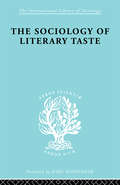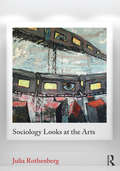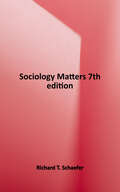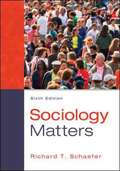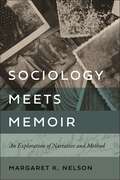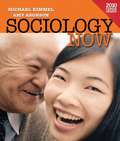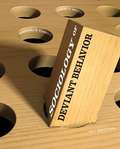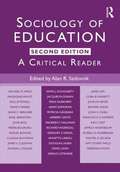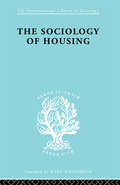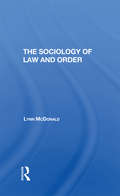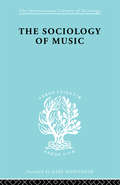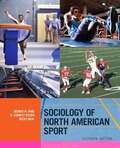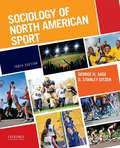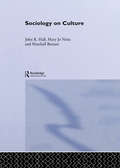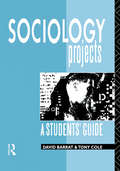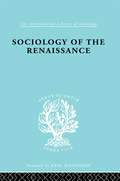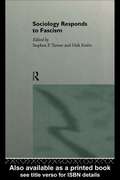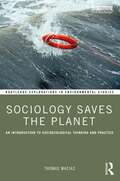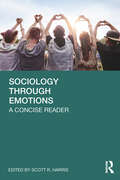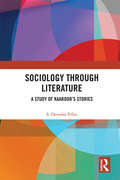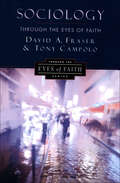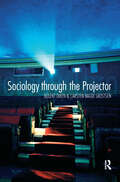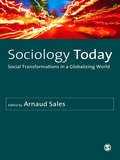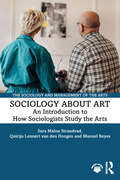- Table View
- List View
Sociology Lit Taste Ils 90 (International Library of Sociology)
by Levin L. SchuckingFirst Published in 1998. Routledge is an imprint of Taylor & Francis, an informa company.
Sociology Looks at the Arts
by Julia RothenbergSociology Looks at the Arts is intended as a concise yet nuanced introduction to the sociology of art. This book will provide a foundation for teaching and discussing a range of questions and perspectives used by sociologists who study the relationship between the arts – including music, performing arts, visual arts, literature, film and new media – and society.
Sociology Masters of Social Thought Course-5 Block 1-4 - Karnataka University
by Mysore Ksou MukthagangotriThis is an educational textbook developed for third-year Bachelor of Arts (BA) students studying in the English medium under the Karnataka State Open University (KSOU), Mukthagangotri, Mysore. It is designed to align with the university's curriculum, offering comprehensive content to support academic learning, critical thinking, and subject-specific understanding for distance education learners.
Sociology Matters
by Richard T. SchaeferThis book is a concise introduction to the discipline of sociology. Its straightforward style, streamlined design, and highly focused coverage make it the perfect affordable, ultra-brief, introductory text for instructors who use a variety of materials in their courses.
Sociology Matters (6th Edition)
by Richard T. SchaeferRichard T. Schaefer's Sociology Matters is a concise introduction to the discipline of sociology.
Sociology Meets Memoir: An Exploration of Narrative and Method
by Margaret K. NelsonHow sociologists can approach memoir in their writing, research, and in the classroomMemoirs attract millions of readers with their compelling life stories, vivid details, and often startling revelations. Beyond entertainment value, however, Margaret K. Nelson argues that memoirs hold potential as powerful resources for sociologists to engage with, analyze, and teach. Sociology Meets Memoir is a short and accessible guide to the significance of memoirs for the field of sociology, from their many possible uses to the numerous challenges they pose.This guide enables sociologists to learn about the different ways memoirs have been used as a medium through which to exercise and encourage the “sociological imagination.” Nelson offers clear definitions of the various and nuanced terms associated with memoir and examples of how different types of stories have been effectively integrated into scholarly research. Readers will gain an understanding of the immense power of memoirs as sociological resources, offering unique access to voices from the past as well as voices from the present which are traditionally marginalized. Nelson also focuses on the genre’s limitations and the difficult methodological questions that accompany their use in scholarly endeavors.Sociology Meets Memoir is a vital tool for all sociologists interested in this growing genre. By reading this guide, students and teachers alike will gain an understanding of how they might approach the current outpouring of memoirs and incorporate them into their teaching, learning, writing, and research.
Sociology Now (Census Update)
by Michael Kimmel Amy AronsonSociology Now reflects the discipline today and explores the big questions about multiculturalism and globalization that sociologists ask.
Sociology Of Deviant Behavior
by Robert Meier Marshall ClinardSOCIOLOGY OF DEVIANT BEHAVIOR has been the market-leading deviance/criminology textbook for more than 40 years by combining timely research findings and updated data with solid sociological analysis. Designed to appeal to today's students, the fifteenth edition examines such relevant and timely topics as justified deviance (e.g., terrorism); corporate crime and mistakes, such as the General Motors ignition problem; the changing moral landscape regarding gay marriage and marijuana use; the importance of social media in facilitating deviant acts; political crime, including electoral crime; and cultural and social reactions to deviance. Learning aids-such as chapter outlines, bolded key terms, discussion questions, and a glossary-support students' study and review.
Sociology Of Education: A Critical Reader 2nd Ed
by Alan R. Sadovnik Ryan CoughlanThis comprehensive and bestselling Reader examines the most pressing topics in sociology and education while exposing students to examples of sociological research on schools. Drawing from classic and contemporary scholarship, noted sociologist Alan R. Sadovnik has chosen readings that examine current issues and reflect diverse theoretical approaches to studying the effects of schooling and society. The second edition provides students with seven new readings from some of the best theorists and researchers in education including James S. Coleman, Madeleine Arnot, and Claudia Buchman. Through full, rather than excerpted primary source readings, students have the opportunity to read sociological research as it is written and engage in critical analyses of readings in their entirety. Including comprehensive section introductions, questions for reflection and discussion, and suggested readings, Sociology of Education will stimulate student thinking about the important roles that schools play in contemporary society and their ability to solve fundamental social, economic and political problems.
Sociology Of Housing Ils 194 (International Library of Sociology)
by R. N. Morris John MogeyFirst Published in 1998. Routledge is an imprint of Taylor & Francis, an informa company.
Sociology Of Law & Order/h
by Lynn McdonaldThis book is about the law and order issue, and the role social scientists have played in legitimating it as a problem of grave social consequences. It is a study on rising crime rates and criminal behaviour within the limits of conventional social science, with its advantages and disadvantages.
Sociology Of Music Ils 91 (International Library of Sociology)
by Alphons SilbermannFirst Published in 1998. Routledge is an imprint of Taylor & Francis, an informa company.
Sociology Of North American Sport
by D. Stanley Eitzen George H. Sage Becky BealNow in its eleventh edition, Sociology of North American Sport offers a compact yet comprehensive and integrated perspective on sport in North American society. Bringing a unique viewpoint to the subject, George H. Sage, D. Stanley Eitzen, and Becky Beal analyze and, in turn, demythologize sport. This method promotes an understanding of how a sociological perspective differs from commonsense perceptions about sport and society, helping students to understand sport in a new way.
Sociology Of North American Sport
by D. Eitzen George SageNow in its tenth edition, Sociology of North American Sport offers a compact yet comprehensive and integrated perspective on sport in North American society. <P><P>Bringing a unique viewpoint to the subject, George H. Sage and D. Stanley Eitzen analyze and, in turn, demythologize sport. This method promotes an understanding of how a sociological perspective differs from common-sense perceptions about sport and society, helping students to understand sport in a new way.
Sociology On Culture
by John R. Hall Mary Jo Neitz Marshall BattaniCulture has become a touchstone of interdisciplinary conversation. For readers interested in sociology, the social sciences and the humanities, this book maps major classical and contemporary analyses and cultural controversies in relation to social processes, everyday life, and axes of ordering and difference - such as race, class and gender. Hall, Neitz, and Battani discuss: self and identity stratification the Other the cultural histories of modernity and postmodernity production of culture the problem of the audience action, social movements, and change. The authors advocate cultivating the sociological imagination by engaging myriad languages and perspectives of the social sciences and humanities, while cultivating cultural studies by developing the sociological imagination. Paying little respect to boundaries, and incorporating fascinating examples, this book draws on diverse intellectual perspectives and a variety of topics from various historical periods and regions of the world.
Sociology Projects: A Students' Guide
by Tony Cole David BarratSociology Projects: A Students' Guide is a no-nonsense, practical guide to project work for Sociology students. It includes everything from advice on how to choose a manageable topic to checklists reminding you what you need to have done by when. Taking you right through from the initial preparation to the final results, this is an entertaining and highly informative workbook. It will show you: * where to look for useful documents * how not to get overwhelmed by data * when to prepare - and how to evaluate - a questionnaire * ways of presenting your material to best effect * how to anticipate both the possibilities and the pitfalls ... and lots more. Written by experienced teachers with extensive knowledge of project work, Sociology Projects will be one of those books a student can't afford to be without!
Sociology Renaissnc Ils 101 (International Library of Sociology #Vol. 9)
by Alfred Von MartinFirst published in 1998. Routledge is an imprint of Taylor & Francis, an informa company.
Sociology Responds to Fascism
by Stephen P. Turner Dirk KäslerWe know a lot about the sociology of fascism, but how have sociologists responded to fascism when confronted with it in their own lives? How courageous or compromising have they been? And why has this history been shrouded in silence for so long? In this major work of historical scholarship sociologists from around the world describe and evaluate the reactions of sociologists to the rise and practice of fascism.
Sociology Saves the Planet: An Introduction to Socioecological Thinking and Practice (Routledge Explorations in Environmental Studies)
by Thomas MaciasHighlighting how the environment and society are intrinsically linked, this book argues that environmental concerns need to be treated as a core concept in the study of sociology. Given its focus on inequality and the constituent elements of the social world, sociology has often been accused of negligence regarding the urgency of the world’s environmental crisis. Sociology Saves the Planet corrects this mis-perception by integrating the theme of environment and society to highlight the intrinsic value a sociological perspective brings to our understanding of the current ecological crisis. The author first draws out the origins of sociology in the social and ecological transformations of the industrial revolution. In accounting for the social upheavals of the 19th century, Emile Durkheim, Karl Marx, and Max Weber all provided key insights into the changing nature of human organization and exploitation of the natural world. Second, readers will explore sociological perspectives developed since that time, grounded in evidence-based research, which highlight the inextricable connection between environment and society. Special attention is devoted to the dual role of people as producers and consumers in the modern context. Lastly, this book examines the significance of major categories of social difference regarding the current environmental crisis. In that regard the question of environmental justice is paramount, illuminating both the disproportionate benefit of natural resource exploitation to those countries and individuals with higher socioeconomic status, and the greater exposure to environmental hazard among those with less. Averting global calamity requires we recognize the unequal social impacts of the environmental crisis while valorizing inclusivity and the diversity of human experience in our search for solutions. Designed for introductory courses, this book is essential reading for sociology students and will be of interest to students and academics studying environment and sustainability more broadly.
Sociology Through Emotions: A Concise Reader
by Scott R. HarrisOffering an accessible and intriguing look at emotions in society, Sociology Through Emotions collects together contemporary qualitative research that illuminates many of sociology’s central concepts and topics, from culture, socialization, and inequality to family, crime, healthcare, religion, and social movements.This book appeals to instructors who want to highlight the social factors that shape emotions as well as the impact of emotions on social life. It is an attractive supplement for courses on introduction to sociology, self and society, social psychology, and others focused on interaction, culture, and meaning making.
Sociology Through Literature: A Study of Kaaroor's Stories
by S. Devadas PillaiThis book presents a comprehensive study of nearly 100 of Kaaroor’s short stories. Kaaroor Neelakanta Pillai is one among the Big Six of the ‘new wave’ in Malayalam literature which began in the mid-1940s. The Big Six and their immediate followers wrote about the common man, peasants, pavement-dwellers, fishermen, rickshaw-pullers, underpaid school teachers — their lives, aspirations and vulnerabilities. By treating Kaaroor’s stories as case studies, the book takes a sociological approach to understanding the representation of a wide array of themes: romantic overtones, erotic pursuits, marital episodes, issues of family, lives of children, behavioural patterns, shades of greed, the idea of spirituality and politics in Malayalam literature. With its annotated transcreation and detailed commentary, this book brings Kaaroor’s works to the general reader, and will be useful to scholars and researchers of South Asian literature, English literature, linguistics, cultural studies, besides those interested in Malayalam literature and the Malayali/Indian diaspora across the world.
Sociology Through the Eyes of Faith (Through the Eyes of Faith)
by David A. Fraser Anthony CampoloColorfully written by two popular and respected sociologists, this volume shows how sociology has evolved, how it became divided from Christian faith, and how Christian sociologists can make sense of this branch of social science.
Sociology Through the Projector (International Library of Sociology)
by Bulent Diken Carsten Bagge LaustsenSociology through the Projector takes issue with the question of how contemporary film can help answering the general, abstract but still urgent question: what is the social today? This book explains the performative relation to contemporary social theory in which cinema functions as a tool for social diagnosis. There is much to be learned about social theory through an encounter with films as films are part and parcel of the society they portray. Increasingly more lay knowledge about social problems and facts stems from cinema as it offers to large audiences a popular and pedagogical introduction to social knowledge. Social theory cannot avoid a critical engagement with cinema as cinema interprets, invents, displaces and distorts the object of sociological inquiry. This book will provide a deeper understanding of contemporary social theory as the chosen films will work as a pedagogical route into contemporary social theory. The films represent a mix of European and American blockbusters and more aesthetically orientated films. The authors question several dominant topics and concerns within social theory and film studies. Firstly, by cross-examining a series of concepts such as identity, representation, memory and surveillance (filming social behaviour) which are of concern to both film theory and social theory. Secondly, by trying to develop imaginative approaches to standard social concerns such as exclusion, gender roles and inequalities, power, infantilisation and commodification of the social and psychological bonds. This book will be a great resource for students and researchers of Sociology, Contemporary Social Theory, Film Studies and Cultural Studies.
Sociology Today: Social Transformations in a Globalizing World (SAGE Studies in International Sociology)
by Arnaud SalesWe are living in a turbulent world marked by fast, continuous social changes that affect the lives of individuals, families, communities, organizations, businesses, nation-states, and international networks. This fundamentally commits contemporary sociology to being a science of change. This collection effectively mirrors this diversity and variety of transformations underway in today's societies and transnational spaces. Written by a group of internationally renowned sociologists, it offers a cutting edge understanding of what is happening in our life worlds, work lives and frames of social existence. Bringing up issues such as political turbulence, cultural and artistic dynamics, family changes, gender roles, migration flows and social movements, it is a timely contribution that discusses transformation and globalization and their consequences in both theoretical and substansive terms. Illuminating and comprehensive, this book will be of immense use for sociology students on all levels, as well as lecturers, researchers and others who are interested in social life and the consequences of human action. Arnaud Sales is Emeritus Proessor of Sociology at the University of Montreal, Canada.
Sociology about Art: An Introduction to How Sociologists Study the Arts (The Sociology and Management of the Arts)
by Sara Malou Strandvad Quirijn Lennert van den Hoogen Manuel ReyesFor sociologists, making, distributing, and using art and cultural products constitute social practices, yet, sociologists disagree on how to investigate these practices. Organised around three main schools of thought – critical sociology, symbolic interactionism, and social systems theory – Sociology about Art serves as an introduction to, and a self-reflective discussion about, how sociologists study the Arts.Providing a wide spectrum of approaches in art sociology, the book focuses on examining not only the famously cited theorists (notably Bourdieu, Becker, and Peterson) but also offers an overview of the sociologists who are often overlooked (Hennion, Heinich, Luhmann, and Van Maanen, among others). In presenting these various approaches, the crux of discussion concerns the status of art in sociological analyses. Following a critical assessment of the classical theories and assessing the risks of failing to observe the function of art, the authors contend that the perspective on art works, their forms, affordances, and meanings, can and should be integrated into sociological research for it to become a sociology that is truly about art.A vital resource for students seeking to understand sociological discourses surrounding art and set up their own research projects, Sociology about Art will appeal to scholars and students of sociology with interests in the arts and cultural policy.
